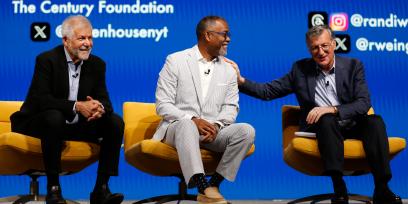To consider the stakes in the November election, AFT President Randi Weingarten convened a panel of distinguished scholars: African American studies professor and bestselling author Dr. Eddie Glaude Jr., history professor and Dissent magazine emeritus co-editor Michael Kazin, and veteran labor journalist and Century Foundation senior fellow Steven Greenhouse.
Asked about the current national mood, Kazin reflected that most Americans say the country is on the wrong track—offering an opening for an authoritarian figure like Donald Trump. Historically, he noted, the only counterpunch is a strong, diverse social movement, as with the abolitionist movement, the 1930s labor movement and the 1960s Black freedom movement. Such a movement doesn’t exist yet today, he noted.
Glaude sees a reckoning with past national wrongs, particularly with the false notion that this is a white republic: “Those ghosts have us by the throat.” But Glaude has hope. He believes that “this is a moment of crisis and a moment of possibility. … Do we have the imagination and the courage to tell the ghosts to go home and rest and … to think about democracy differently?” Greenhouse agreed, saying, “The nation has not been this divided” since the Civil War.
Weingarten asked how we can “engage on both hope and fear.”
Kazin responded that the answer is grass-roots, one-on-one organizing to counter social and mainstream media. He believes unions have a unique power to make those connections and revive democracy.
Glaude expanded on that idea, challenging us to think of how enslaved mothers found hope in their children and imagined new possibilities. He said, “Our task is to run toward the fear and imagine a new world—and then make it a reality.”
Greenhouse described journalists and teachers as crucial truth-tellers to convey Trump’s record of union-busting, weakening safety standards, opposing a higher minimum wage and installing a right-wing Supreme Court. He observed that, despite his working-man rhetoric, “Trump is not really a friend of workers.” In contrast, he believes Joe Biden has been the most pro-union president in history—surpassing even Franklin D. Roosevelt. He pointed out that Kamala Harris is also staunchly pro-labor. Example: When she was running for president in 2020, she proposed raising an additional $300 billion from estate taxes to fund better salaries for America’s underpaid teachers.
Asked how to address many voters’ belief that it’s simply time for a change in American leadership, Greenhouse voiced a narrative that “the economy is in very good shape,” citing low unemployment, calming inflation and the “highest growth in the industrial world.” Kazin offered a different perspective: “I don’t think you can tell people who think things aren’t good, ‘Oh no, the economy is really good.’ … You’ve got to … be empathetic with people’s discontent in order to convince them otherwise, but then you have to do the hard work” of connecting and persuading.
Greenhouse acknowledged, “Many American workers have unfortunately had it very hard for decades and decades, but … [now] they are much unhappier. … The Republicans have done an amazing job blaming the Democrats.” Kazin answered, “The rent’s still too, too damn high.”
Glaude added, “For too long we’ve been living under the framework of a zero-sum game, that there’s only so much pie to go around. … Let’s bake a bigger damn pie.”
[Chris Bartolomeo, photos by Suzannah Hoover and Pamela Wolfe]


